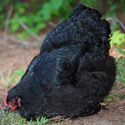
Some chicken keepers deworm their chickens too often. Others don’t deworm often enough. How often your chickens need deworming, or whether they need it at all, depends on numerous factors. These factors include your climate, how your flock is housed and managed, the kind of worms that are present in your chickens’ environment, and the type of dewormer you use.
Chickens raised in a warm, dry climate are less at risk for a worm load than chickens raised in a wetter climate. That’s because parasitic worm eggs and larvae dry up and die when exposed to air and sunlight. In a rainy climate, or in any area experiencing more than the usual amount of rainfall, worm eggs and larvae in the environment survive longer, because they are protected from drying out by moisture and mud. Since more parasites survive, the potential for a worm overload in chickens increases, and therefore more aggressive parasite control and deworming measures are needed.
Each worm species has one of two types of parasitic life cycles: direct and indirect. Direct-cycle worms move from one chicken to another by means of worm eggs or larvae expelled by an infected chicken into the environment that are then eaten by another chicken that thus becomes infected. Indirect-cycle worms must first enter some other creature during an immature stage of their lives. Such a creature, called an alternate host, might be an ant, beetle, earthworm, fly, grasshopper, slug, snail, or termite. A chicken gets infected by eating the alternate host.
All tapeworms and more than half the roundworm species that infect chickens have indirect life cycles. Effective worm control therefore involves monitoring alternate hosts that can potentially infect your chickens. Beetles and grasshoppers, for instance, are more abundant in late summer. Earthworms come to the soil’s surface after a heavy rain. Slugs and snails are also more plentiful in warm, wet weather than in either cold weather or hot, dry weather.
The presence of alternate hosts is also influenced by flock housing and management. A chicken in a cage is most likely to be infected by flies. Chickens penned on litter are most likely to be infected by cockroaches, beetles, and other indoor-living creatures. Free range flocks are more likely to being infected by earthworms, grasshoppers, slugs, snails and other outdoor-living creatures. In a warm, humid climate, where alternate hosts are prevalent year around, more aggressive deworming is required compared to a cold climate where alternate hosts are inactive for part of the year.
Direct cycle worms can be an issue in chickens housed on litter and using the same run year after year. Indoors, the spread of direct cycle parasites can be minimized by having a droppings pit beneath roosts so chickens can’t peck in the accumulation, or by frequently cleaning out the droppings. After a deworming treatment, thoroughly cleaning out and replacing the old litter reduces the speed of reinfestation. Outdoors, rotating the run and either tilling the soil or mowing vegetation in the previous run reduces the parasite population by exposing expelled worms, larvae, and eggs to drying sunlight, helping reduce the overall population.
Of the many livestock dewormers on the market, the only one that is FDA approved for chickens is piperazine, sold under the trade name Wazine, which is effective only against large roundworms, but not other roundworm species or tapeworms. It affects only adult worms, not young worms that might be attached to a chicken’s intestinal lining. Treatment must therefore be repeated in 7 to 10 days to catch young worms that have matured and released their hold on the intestinal lining. Piperazine is not approved for hens laying table eggs. The withdrawal period for meat birds is 14 days.
The only way to know for sure if and when your chickens need deworming is through regular fecal exams. Most veterinarians offer fecal exams for a nominal fee and can tell you if your chickens are wormy, what kind of worms they have (if any), and how often they might require deworming. You can also learn to do your own fecal tests following directions freely available on various websites and also found in The Chicken Health Handbook.
The indiscriminate routine use of any dewormer is not the best answer to parasite control, because repeated use causes worms to eventually become resistant to the dewormer. It’s comforting to know that once a healthy chicken reaches maturity, it becomes resistant to parasitic worms and less in need of deworming.
And that’s today’s news from the Cackle Coop.
Gail Damerow, author, The Chicken Health Handbook


I was told that the Redquill that I bought off of yall are not pure at a few poultry shows why is this
Love the article. There is a new wormer on the market called Strike III, it comes in a small package which is good for the home flock customers, is labeled for laying hens and takes care of multiple worm species.
The active ingredient in Strike III is the antibiotic Hygromycin B, which has been sold as a dewormer under other brand names. Hygromycin B is a VFD (Veterinary Feed Directive) drug, meaning it requires a prescription under an FDA regulation that came into effect as of 2017.